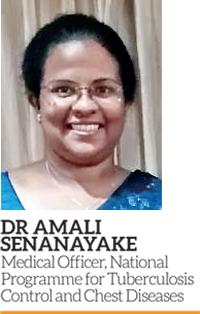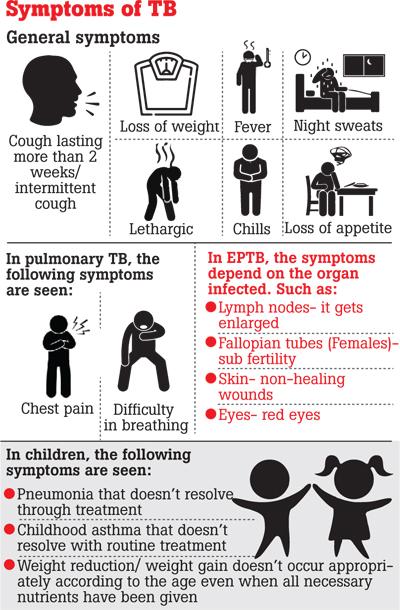Reply To:
Name - Reply Comment
 Every day nearly 4000 people globally lose their lives to Tuberculosis (TB). In Sri Lanka TB is the second most common infective disease and annually 8000-9000 TB patients are reported. “But the WHO estimates around 13 000- 14 000 patients should be reported annually,” stated Dr Amali Senanayake, Medical Officer, Health Education and Promotion Unit, National Programme for Tuberculosis Control and Chest Diseases (NPTCCD). She also added that prior to COVID- 19 TB was the most common infective disease to cause deaths. “It is a huge public health burden in the country,” she said adding that the disease was reported island- wide but most common in Colombo, Gampaha, Kalutara, Kandy, Kurunegala and Rathnapura
Every day nearly 4000 people globally lose their lives to Tuberculosis (TB). In Sri Lanka TB is the second most common infective disease and annually 8000-9000 TB patients are reported. “But the WHO estimates around 13 000- 14 000 patients should be reported annually,” stated Dr Amali Senanayake, Medical Officer, Health Education and Promotion Unit, National Programme for Tuberculosis Control and Chest Diseases (NPTCCD). She also added that prior to COVID- 19 TB was the most common infective disease to cause deaths. “It is a huge public health burden in the country,” she said adding that the disease was reported island- wide but most common in Colombo, Gampaha, Kalutara, Kandy, Kurunegala and Rathnapura
Dr Senanayake notes that the disease has had a long history and has also been found to be present in the Stone Age. “Recent researches show that it has shaped the human society since Stone Age.” She further went on to state that TB was a disease transmitted via air-borne droplet particles. These particles would contain the causative bacteria Mycobacterium tuberculosis.
TB meningitis and Miliary TB is common in children.
 Symptoms of TB
Symptoms of TBGeneral symptoms
In pulmonary TB, the following symptoms are seen:
In EPTB, the symptoms depend on the organ infected. Such as:
In children, the following symptoms are seen:
 Diagnosis and treatment
Diagnosis and treatment“When a doctor suspects the patient has TB, a Chest X Ray, Sputum test- which undergoes a microscopic testing and a molecular testing called GeneXpert, are taken,” shared Dr Senanayake. Once diagnosed, a multi- drug treatment is conducted. The treatment would last for 6 months- 1 year. Since the drugs have to be taken every day without fail, DOT (Directly Observed Therapy) is used where a designated individual watches the patient take every dose of each drug. This ensures that the drugs are taken routinely without fail. “If the treatment is interrupted or the patient doesn’t take the drugs for the prescribed time, the patient can develop MDRTB (Multi Drug Resistance TB). In this TB, the patient is resistant to the drugs commonly used to treat TB.
Close contacts of the patients, immunocompromised patients such as those who have diabetes, CKD, HIV- AIDs and people who live in congested areas. The disease is also common in males. 3% of children get infected with TB.
Dr Senanayaka also pointed out that substance abuse, smoking and crowded living especially in urbanized areas are also causative factors for the transmission of TB.
The doctor said that an individual can contract the disease immediately or a person might not get the disease until 10- 15 years after the infection.
She shared that if one suspects having TB, the individual should go to the government hospitals or the District Chest Clinic- DCC (available in all districts and also available in Kalmunai, Kalubowila and Mulleriyawa). “Once diagnosed with TB, contact tracing will be conducted and close contacts will also be screened for TB,” she stated. Even when it is diagnosed at the government hospitals, the treatment and care will be provided at the DCC.
She shared that the investigations, services and drugs are provided free of charge. For patients with financial difficulties, the DCC in collaboration with the Social Services Dept provides a monthly allowance along with a monthly Thriposha supplement.
“But most people do not seek treatment for TB or even want to test themselves because of the stigma surrounding TB. It is an incorrect belief that people have that TB is a ‘low- class people’ disease,” explained Dr Senanayake.
She noted that the current preventive measures taken for the COVID- 19 disease also applies for prevention of TB. “Practising good respiratory hygiene/ cough etiquette, wearing masks, social distancing helps in preventing TB. Direct sunlight also helps to kill the bacteria. Therefore, houses and buildings should allow the interiors to be exposed to direct sunlight via windows etc.” She also stated that it was important to prevent TB as it is a severe disease that can lead to paralysis and death.
Commenting on the BCG vaccine, she shared that the vaccine prevents the incidence of TB meningitis and Miliary TB.